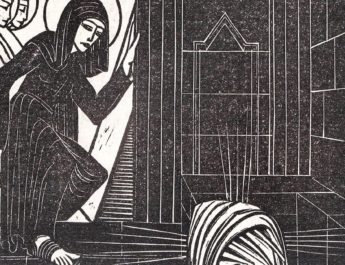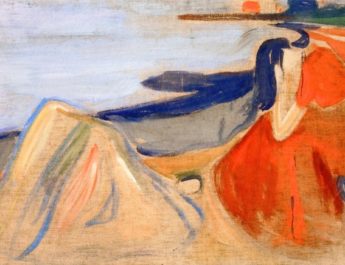Isaiah 61:1-4, 9-11
Holy Saturday ABC
1 The spiritA of the LordB GodC is upon me,
because the Lord has anointedD me;
A “spirit” = ruach. This is breath, wind, air, cool, spirit. This is wind, which resembles the breath and so this can be used figuratively for life itself or being frail/mortal/impermanent. It can refer to the air of the sky or the spirit.
B “Lord” = Adonai. From adon (lord, master, owner); root means to rule or be sovereign. This is the actual Hebrew word for Lord used (in a different form) of humans and (in the present form) of God. It means someone who is in control.
C “God” = YHVH. From havah (to be, become) or hayah (to come to pass, become, be). This is the name of the God of Israel, the self-existent and eternal one, the tetragrammaton. This pronunciation has been lost to time so “Lord” is generally used in its place.
D “anointed” = mashach. This is smear, paint, spread, or paint. It can also be to rub with oil or, otherwise stated, to anoint. This implies a consecration. This root verb is where the word “messiah” comes from.
he has sent me to bring good newsE to the oppressed,F
to bind upG the brokenhearted,H
to proclaim libertyI to the captives,
and releaseJ to the prisoners;K
E “bring good news” = basar. This is being a messenger, to publish, carry, or preach. Properly, this is being fresh, rosy or cheerful as one bearing news
F “oppressed” = anav. From anah (to be bowed down; can refer to a sense of humility or to a sense of being browbeaten, oppressed, afflicted, or depressed; literal or figurative – depressed in mood or circumstance). This is poor, needy, afflicted as well as humble or meek.
G “bind up” = chabash. This is to wrap tightly or bind, to bandage, or heal. It can be to saddle an animal or wrap a turban. Figuratively, it can mean to stop or to govern.
H “brokenhearted” = shabar + leb. Shabar is to break, collapse, destroy, break in pieces, tear. It is bursting in a literal or figurative sense. Leb may be related to labab (to encourage; properly, to be encased as with fat; used in a good sense, this means to transport someone with love; used in a bad sense, it can mean to dull one’s senses). This is the heart, courage, one’s inner self, the mind, or the will. Heart is only used in a figurative sense in the Old and New Testaments
I “liberty” = deror. 8x in OT. This is flowing quickly – hence flowing free, release, and liberty. It can also mean pure or clear.
J “release” = peqach-qoach. 1x in OT. From paqach (to open one’s eyes). This is literally an opening – by extension, opening a prison. Figuratively, this is freedom or salvation.
K “prisoners” = asar. This is to tie, yoke, bind, or fasten. It can mean to harness an animal, to join in fighting a battle, or to imprison someone.
2 to proclaim the year of the Lord’s favor,L
and the day of vengeanceM of our God;N
to comfortO all who mourn;
L “favor” = ratson. From ratsah (to be pleased with, delight, take pleasure in, or accept with favor; to approve or consent regarding something; can be used specifically of satisfying debts or being pardoned). This is delight shown in favor, good will, something that is accepted or acceptable.
M “vengeance” = naqam. 17x in OT. From naqam (to avenge, punish, have a grudge, execute). This can be a quarrel or vengeance.
N “God” = Elohim.
O “comfort” = nacham. Properly, this is a strong breath or a sigh. This can be to be sorry, to pity, console. Comfort, or repent. But, one can also comfort oneself with less righteous thoughts, so this can also mean to avenge oneself.
3 to provide for those who mourn in ZionP—
to give them a garlandQ instead of ashes,
the oilR of gladnessS instead of mourning,
P “Zion” = tsiyyon. The word is related to tsyiyyun (signpost, monument); from tsavah (to charge someone, to command, order); from the same as tsiyyah (dryness drought); from a root meaning parched as desert, dry land. Zion can refer to a mountain in Jerusalem as well as another name for Jerusalem itself or the people.
Q “garland” = p’er. 7x in OT. From paar (to beautify or adorn, to gleam; can refer to showing honor or glorifying someone; also to boast or to shake a tree for harvest). This is beauty or embellishment. It is used of priestly headdresses, garlands, ornaments, and turbans.
R “oil” = shemen. From shamen (to shine, which implies being oily, growing fat). This is fat, oil, grease, olive oil – often with perfume. Used figuratively for fertile, lavish, rich.
S “gladness” = sason. From sus (to rejoice, be glad; properly, to be bright or cheerful). This is rejoicing, cheerfulness, and welcome.
the mantleT of praiseU instead of a faintV spirit.
They will be called oaksW of righteousness,X
the planting of the Lord, to display his glory.Y
T “mantle” = maateh. 1x in OT. From atah (to enwrap, cover, roll or to wear). This is a mantle, wrap, or other garment.
U “praise” = tehillah. From halal (to praise, be boastful). This is praise or a song of praise. It is to offer God a hymn, to boast in God. This shares a root with “hallelujah.”
V “faint” = keheh. 9x in OT. From kahah (to darken, grow faint, fail, be weak, have one’s eye dim or become dull). This is dark, faded, feeble, dim, smoking, or obscure. It can also mean abated.
W “oaks” = ayil. From the same as ul (mighty, strength, body, belly; root may mean to twist and that implies strength and power). This is strength so it is used to indicate things that are strong or powerful: political chiefs, rams, posts, trees, oaks.
X “righteousness” = tsedeq. This is rightness, righteousness, vindication. It is everything that is just or ethical. That which is right in a natural, moral, or legal sense. It also includes just weights (i.e. true weights). Figuratively, this is justice, righteousness, equity – even prosperity.
Y “display…glory” = paar. Related to “garland” in v3. See note Q above. 14x in OT.
4 They shall build upZ the ancientAA ruins,BB
they shall raise upCC the former devastations;DD
Z “build up” = banah. This is to build, make, set up, restore, repair, or obtain children. It is to build literally or figuratively
AA “ancient” = olam. This is a long scope of time whether in the past (antiquity, ancient time) or in the future (eternal, everlasting).
BB “ruins” = chorbah. From chareb (to be a wasteland or desolate or devastated). This is a wasteland, desert, or ruin. Properly, it is a place impacted by drought or decayed.
CC “raise up” = qum. To arise, stand, accomplish, establish, abide. This is rising as in rising against, getting up after being sick or asleep, arising from one state to another, becoming powerful, or rising for action. It can also be standing in a figurative sense.
DD “devastations” = shamem. This is to stun or become numb. It can also mean to devastate or be appalled. Can also mean to be amazed or astonished.
they shall repairEE the ruinedFF cities,GG
the devastations of many generations.HH
EE “repair” = chadash. 10x in OT. This is to renew or restore, to repair or rebuild.
FF “ruined” = choreb. Related to “ruins” in v4. 16x in OT. From chereb (a tool that cuts like a knife, axe, or sword); from chareb (see note BB above). This is drought, heat, wasteland, or desolation.
GG “cities” = iyr. From uwr (to awaken or wake oneself up). This can mean excitement in the sense of wakefulness or city. Properly, this is a place that is guarded. Guards kept schedules according to watches. This sense of the word would include cities as well as encampments or posts that were guarded.
HH “many generations” = dor + dor. Literally “of generations and generations.” From dur (to move in a circle, which implies living somewhere or remaining there; it can also be the sense of piling or heaping up). This is a revolution of time, which is to say, an age or generation. It can also be a dwelling or one’s posterity.
9 Their descendantsII shall be knownJJ among the nations,KK
and their offspringLL among the peoples;MM
all who see them shall acknowledgeNN
that they are a peopleOO whom the Lord has blessed.PP
II “descendants” = zera. From zara (to sow or scatter seed; conceive or yield). This is seed or sowing. It can, thus, mean a fruit, plant, sowing time, child, offspring, or posterity.
JJ “known” = yada. This is to know, acknowledge, advise, answer, be aware, be acquainted with. Properly, this is to figure something out by seeing. It includes ideas of observation, recognition, and care about something. It can be used causatively for instruction, designation, and punishment.
KK “nations” = goy.From the same root as gevah (the back, person, or body); related to gev (among); related to gaah (to rise up). This is nation or people. Often used to refer to Gentiles or foreign nations. It can also be used figuratively for a group of animals. This is where the Yiddish “goy” comes from.
LL “offspring” = tseetsa. 11x in OT. From yatsa (to go or come out, bring forth, appear; to go out in a literal or figurative sense). This is that which comes forth i.e. offspring, children, crops, springs, etc.
MM “peoples” = am. From amam (to darken, hide, associate; creating shadows by huddling together). This is people or nation. It can be used specifically for a tribe, collectively of troops or armies, or figuratively to refer to a flock of animals.
NN “acknowledge” = nakar. This is to recognize, examine, take notice, show, scrutinize. It is looking at something in a fixed way, showing perhaps respect or reverence. Alternately, it can show gazing with suspicion. Also, it can mean being strange towards someone or something and rejecting or ignoring it.
OO “people” = zera. Same as “descendants” in v9. See note II above.
PP “blessed” = barak. This is to kneel, to bless. It is blessing God as part of worship and adoration or blessing humans to help them. It can be used as a euphemism to say curse God.
10 I will greatly rejoiceQQ in the Lord,
my whole beingRR shall exultSS in my God;
for he has clothedTT me with the garmentsUU of salvation,VV
QQ “greatly rejoice” = sus + sus. Related to “gladness” in v3. See note S above. This is to rejoice, be glad. Properly, it means being bright or cheerful. The word is repeated twice – the first time as an Infinitive Absolute. The Infinitive Absolute serves to emphasize the sentiment of the word. It is rather like Foghorn Leghorn’s speech pattern, “I said, I said.”
RR “whole being” = nephesh. Related to naphash (to refresh or be refreshed). This is soul, self, person, emotion. It is a breathing creature. Can also refer to appetites and desires.
SS “exult” = gil. Properly, this is twirling around because of a strong feeling whether of rejoicing or from fear. This can be rejoice, be glad or joyful, or to cry.
TT “clothed” = labash. This is to wrap around, which implies clothing oneself or someone itself. This is wrapping around in a literal or figurative way.
UU “garments” = beged. From bagad (to cover or conceal; figuratively, to act in a covert or treacherous way, to transgress or pillage). This is clothing, garment, robe, or some other kind of clothing. Figuratively, it can be treachery or pillaging.
VV “salvation” = yesha. From yasha (to deliver, defend, help, preserve, rescue, be safe. Properly, to be open, wide or free, which implies being safe. Used causatively, it means to free). This is salvation, deliverance, rescue, safety, welfare, liberty.
he has coveredWW me with the robeXX of righteousness,YY
as a bridegroomZZ decksAAA himself with a garland,
and as a brideBBB adornsCCC herself with her jewels.DDD
WW “covered” = yaat. Perhaps related to “mantle” in v3. 1x in OT. Perhaps from atah (see note T above). This is to cover or clothe.
XX “robe” = meil. From maal (to cover up; figuratively, to act in a covert or treacherous way, to be unfaithful or transgress). This is a robe, mantle, or cloak – an outer garment.
YY “righteousness” = tsedeqah. Related to “righteousness” in v3. From the same as tsedeq (see note X above). This is righteousness, justice, righteous acts, and moral virtue.
ZZ “bridegroom” = chatan. From chatan (to ally in marriage; to give one’s daughter away in marriage). This is bridegroom, husband, or son-in-law.
AAA “decks” = kahan. From kohen (a priest, one who officiates or acts as priest). This is officiating as a priest does over religious service. It can also figuratively mean donning regalia or formal ornamentation/attire.
BBB “bride” = kallah. Perhaps related to kalal (to complete, perfect). This is bride or daughter-in-law and the term is used before and after marriage.
CCC “adorns” = adah. 10x in OT. This is to advance or continue. It can also mean to take away or remove. Plus, it has a specific usage as adorning oneself with ornaments.
DDD “jewels” = keli. From kalah (to end, be finished, complete, prepare, consume, spent, or completely destroyed). This is something that was prepared – any implement, utensil, article, vessel, weapon, or instrument. Also includes jewels, weapons, bags, carriages, and furniture.
11 For as the earth brings forthEEE its shoots,
and as a gardenFFF causes what is sownGGG in it to spring up,HHH
so the Lord God will cause righteousness and praise
to spring up before all the nations.
EEE “brings forth” = yatsa. Related to “offspring” in v9. See note LL above.
FFF “garden” = gannah. 12x in OT. From gan (garden that is fenced in; an enclosure); from ganan (to put a hedge around – generally, protect or defend; to cover or surround). This is a garden or an orchard.
GGG “what is sown” = zerua. Related to “descendants” in v9. 2x in OT. From zara (see note II above). This is something that is sown, which is to say a plant or the act of sowing itself.
HHH “spring up” = tsamach. Related to “shoots” in v11. This is to sprout or spring up.
Image Credit: “Israel” by Mike Moyers, 2011.




